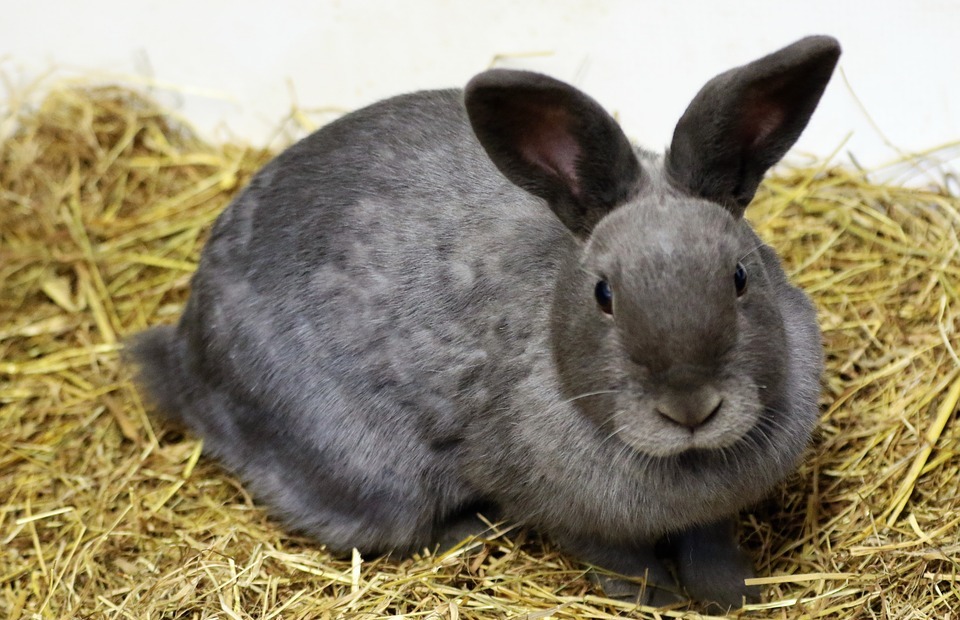This article sheds light on the common misconception that rabbits are hypoallergenic, diving deep into the science behind rabbit allergies. We'll discuss the allergens involved, the factors influencing allergic reactions, and provide practical advice for managing allergies if you're considering a rabbit as a pet.
Part 1: Debunking the Myth of Hypoallergenic Rabbits

1.1. Unveiling the Allergen: More Than Just Fur
It's crucial to understand that the term "hypoallergenic" doesn't apply to rabbits. While their soft fur might seem innocent, the real culprit behind allergic reactions is a protein found in their saliva, urine, and skin flakes, known as Fel d 1. This protein is also found in cats and triggers allergic responses in sensitive individuals.
1.2. Dander, Not Fur: The Root of the Problem
The common misconception that hypoallergenic animals produce less fur is misleading. It's not the amount of fur that matters, but the presence of allergens in dander, microscopic skin flakes shed by animals. Rabbits produce dander just like other animals, and these tiny particles carry the allergen Fel d 1, leading to allergic reactions.
Part 2: The Science Behind Rabbit Allergies

2.1. Understanding the Immune System's Response
When someone with a rabbit allergy comes into contact with Fel d 1, their immune system identifies it as a threat. This triggers the release of antibodies, particularly immunoglobulin E (IgE), which attach themselves to mast cells in the body. Upon subsequent exposure, these mast cells release histamine and other chemicals, leading to the characteristic allergy symptoms.
2.2. Symptoms of Rabbit Allergies: Recognizing the Signs
Allergic reactions to rabbits can manifest in various ways, ranging from mild to severe:
- Respiratory Symptoms: Sneezing, coughing, and a runny nose are common signs, indicating the body's attempt to clear the allergens from the respiratory system.
- Eye and Skin Irritation: Itchy eyes and skin, often accompanied by redness and swelling, are a result of the body's inflammatory response to the allergen.
- Wheezing and Difficulty Breathing: In more severe cases, allergies can trigger asthma-like symptoms, causing wheezing and making it hard to breathe.
- Skin Rashes and Hives: These can appear as red, itchy bumps or raised welts, known as hives, signifying a more widespread reaction to the allergen.
2.3. Diagnosing Rabbit Allergies: Finding the Source
If you suspect you might be allergic to rabbits, consulting a doctor or allergist is essential for diagnosis. Common diagnostic methods include:
- Skin Prick Test: This involves pricking the skin with a small amount of the suspected allergen and observing the reaction. A raised, red welt indicates a positive reaction.
- Blood Test: This test measures the level of IgE antibodies in the blood, which can indicate an allergy to specific allergens.
Part 3: Managing Rabbit Allergies: Living in Harmony
3.1. Minimising Exposure: Reducing Allergen Levels
Once you're diagnosed with a rabbit allergy, reducing your exposure to allergens is crucial for managing symptoms. Here are some practical steps:
- Regular Cleaning: Vacuuming, dusting, and wiping surfaces regularly can help remove allergens. Consider using a vacuum cleaner with a HEPA filter to capture smaller particles.
- Air Purification: Air purifiers equipped with HEPA filters can effectively remove airborne allergens, improving the overall air quality in your home.
- Designated Rabbit Zones: Create specific areas in your home for your rabbit, limiting their access to other spaces, especially bedrooms, where you spend significant time.
- Limited Direct Contact: While tempting, limit direct contact with your rabbit, especially during grooming or playtime. Consider using gloves when handling them.
- Washing Hands Regularly: Wash your hands thoroughly with soap and water after handling your rabbit or touching their belongings.
3.2. Medication and Other Management Strategies: Finding Relief
Over-the-counter and prescription medications can help manage allergy symptoms:
- Antihistamines: These medications block the effects of histamine, reducing symptoms like sneezing, runny nose, and itching.
- Nasal Corticosteroids: These nasal sprays help reduce inflammation in the nasal passages, alleviating congestion and runny nose.
- Decongestants: These medications can help relieve nasal congestion and pressure.
For severe allergies, immunotherapy (allergy shots) might be recommended to gradually desensitize your immune system to the allergen. This involves receiving regular injections of increasing doses of the allergen over time, helping your body adjust to its presence.
Part 4: Making Responsible Choices: Weighing Your Options
4.1. Testing Before Adoption: Making an Informed Decision
Before bringing a rabbit home, it's crucial to get tested for allergies. This will help you understand your sensitivity level and make an informed decision about whether owning a rabbit is a viable option for you.
4.2. Exploring Alternatives: Finding a Suitable Pet
If allergies prevent you from owning a rabbit, consider exploring hypoallergenic pet options:
- Fish: Fish are generally considered hypoallergenic, as they don't produce fur or dander.
- Birds: While not completely hypoallergenic, some bird species produce fewer allergens than others. Research specific breeds before making a decision.
- Reptiles: Reptiles like snakes, lizards, and turtles don't produce fur or dander, making them a suitable alternative for allergy sufferers.
4.3. Responsible Pet Ownership: Caring for Your Rabbit
If you decide to get a rabbit despite allergies, responsible ownership is crucial. This includes:
- Maintaining Excellent Hygiene: Regularly clean the rabbit's cage, bedding, and toys to minimise allergen buildup.
- Avoiding Close Contact: Limit direct contact with your rabbit and opt for gentle petting sessions with gloves.
- Investing in Air Filters: Use high-quality air purifiers with HEPA filters to remove allergens from the air in your home.
- Consulting a Veterinarian: Discuss your allergy concerns with your veterinarian, who can offer advice on managing your allergy and ensuring your rabbit's health.
Part 5: Understanding Rabbit Allergies: Frequently Asked Questions
5.1. Can Rabbits Be Hypoallergenic?
No, rabbits are not hypoallergenic. Their saliva, urine, and skin flakes contain allergens that trigger allergic reactions.
5.2. Do Certain Rabbit Breeds Produce Fewer Allergens?
While there is some evidence suggesting that certain breeds might produce fewer allergens, research on this is still limited. More extensive studies are needed to confirm these claims.
5.3. What Can I Do If I'm Allergic to Rabbits But Want One as a Pet?
Consult a doctor or allergist to determine your sensitivity level. They can recommend management strategies like allergen reduction, medication, and immunotherapy.
5.4. Can Allergies to Rabbits Develop Over Time?
Yes, allergies can develop at any age, even if you haven't had previous reactions. This is due to changes in the immune system's sensitivity over time.
5.5. Is It Possible to Be Allergic to Only Certain Rabbits?
While unlikely, it's possible to be allergic to specific individuals or breeds due to variations in allergen production. However, it's generally recommended to avoid contact with all rabbits if you have a known allergy.
5.6. Can I Get Rid of My Rabbit If I Develop Allergies?
Rehoming a pet is never an ideal solution. If you develop allergies, explore ways to manage them while keeping your rabbit. Consider finding a suitable environment for your rabbit, such as a loving home with someone who isn't allergic.
5.7. Can I Test My Rabbit for Allergens?
It's not possible to test a rabbit for the presence of allergens. Allergic reactions are caused by your immune system's response to the allergen, not the amount present in the rabbit.
5.8. Can I Train My Rabbit to Be Less Allergenic?
You cannot train a rabbit to produce fewer allergens. Allergens are a natural part of their biology, and it's impossible to change them through training.
5.9. Are All Rabbits Equally Allergenic?
While there is some evidence suggesting that certain breeds might produce fewer allergens, individual rabbits can also vary in allergen levels. It's impossible to predict how allergenic a rabbit will be until you're exposed to it.
5.10. Can a Rabbit's Diet Affect Allergen Levels?
There's no strong evidence that diet can significantly reduce allergen levels in rabbits. However, a healthy diet can support their overall well-being, which may indirectly affect allergen production.
This information is meant to be a comprehensive guide to rabbit allergies. If you have concerns about your health or a rabbit's well-being, consult a doctor or a veterinarian.
Everyone is watching
-

Do Rabbits Lay Eggs? (The Surprising Truth)
OTHER TYPES OF PETSThis article will unravel the common misconception that rabbits lay eggs, exploring the fascinating world of r...
-

Can Rabbits Eat Grapes? A Guide to Safe Rabbit Treats
OTHER TYPES OF PETSThis comprehensive guide will explore the safety and suitability of grapes for rabbits, providing detailed inf...
-

What's a Group of Rabbits Called? (A Comprehensive Guide)
OTHER TYPES OF PETSThis article delves into the fascinating world of rabbits, exploring the various terms used to describe a grou...
-

Predators That Hunt Rabbits: A Guide to Natural Enemies
OTHER TYPES OF PETSI've always been fascinated by the circle of life, that delicate dance between predator and prey. Growing up ...
-

Are Rabbits Nocturnal Animals?
OTHER TYPES OF PETSThe question of whether rabbits are nocturnal animals is a fascinating one, with a surprisingly complex answer...
